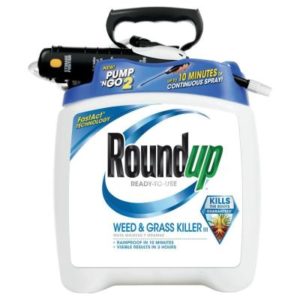 People don't realize the incredibly large amounts of pesticides applied to crops and soil in the US each year. Hundreds of millions of pounds! Which is the reason pesticides are found in our air, rain, water, soil, our foods, and in our bodies.
People don't realize the incredibly large amounts of pesticides applied to crops and soil in the US each year. Hundreds of millions of pounds! Which is the reason pesticides are found in our air, rain, water, soil, our foods, and in our bodies.
One of the pesticides that scientists are getting increasingly concerned with is the weed-killer glyphosate. It is the most used herbicide (weed-killer) in the world! It is found in Roundup, in non-organic crops, and even in genetically modified crops that are glyphosate resistant. Especially used on corn and soybeans, but also in a variety of crops (e.g., wheat, oats, cranberries, grapes, apples, beans).
The following story lays out the great amounts used in some states, especially in the midwest and southern states. Overall, an average of almost 130 pounds of glyphosate were sprayed per square mile in US counties each year.
But some counties had incredibly high amounts, such as Nueces County, Texas which has the highest use of glyphosate: more than 1,100 pounds sprayed per square mile. Iowa and Illinois (corn and soybean crops) accounted for 15% of national usage. The least was in northeastern (e.g., Massachusetts) and southwestern states (e.g., Nevada).
Evidence for health harms are increasing each year, such as an increased risk of cancer (e.g., non-Hodgkin lymphoma), premature births, endocrine disruption, and even disruptions of the gut microbiome (it kills beneficial microbes in the gut). The percentage of people with glyphosate detected in their urine, and the amount (concentration) has been rising over time. It can now be detected in almost all of us.
By the way, the EPA has raised "allowable limits" of glyphosate in foods over the years - when the pesticide industry asked for it. The US limits are much higher than those allowed in Europe - twice the levels! (Once again, in the US the EPA favors industry, not the people it's supposed to be protecting.)
This article is from October 2022, but it highlights the incredibly high amounts of glyphosate applied in the US (see the good interactive map). Excerpts from NBC News: A potentially cancer-causing chemical is sprayed on much of America’s farmland. Here is where it is used the most.
Every day, farms across the country use a potentially cancer-causing chemical that is in the world’s most common weedkillers. And data shows that it’s most used in the Midwest and parts of the South. ...continue reading "Enormous Amounts of One Pesticide Used In the US"
 This comes under the realm of fun fact: A large study of over 21 million births over four decades in Japan found that most births occur during weekdays and not weekends or holidays.
This comes under the realm of fun fact: A large study of over 21 million births over four decades in Japan found that most births occur during weekdays and not weekends or holidays.

 People don't realize the incredibly large amounts of pesticides applied to crops and soil in the US each year.
People don't realize the incredibly large amounts of pesticides applied to crops and soil in the US each year.  It turns out that another nasty pesticide is found in almost all of us, which we get from the foods we eat. This is the pesticide chlormequat, which is known to have harmful health effects. The use of chlormequat is on the rise in North America and Europe, where it is applied to non-organic grain crops as a plant growth regulator.
It turns out that another nasty pesticide is found in almost all of us, which we get from the foods we eat. This is the pesticide chlormequat, which is known to have harmful health effects. The use of chlormequat is on the rise in North America and Europe, where it is applied to non-organic grain crops as a plant growth regulator. Chemicals known as "forever chemicals" or PFAS have been in the news a lot recently. This is because PFAS (per- and polyfluoroalkyl substances) are in so many products that we all use, yet research is showing more and more health harms from them. Including to pregnant women and developing babies.
Chemicals known as "forever chemicals" or PFAS have been in the news a lot recently. This is because PFAS (per- and polyfluoroalkyl substances) are in so many products that we all use, yet research is showing more and more health harms from them. Including to pregnant women and developing babies. Unfortunately, unprocessed and minimally processed foods are more expensive than ultra-processed foods. So it wasn't surprising that socioeconomic levels (including income levels) made a difference - the lower the household income, the greater the average ultra-processed food intake.
Unfortunately, unprocessed and minimally processed foods are more expensive than ultra-processed foods. So it wasn't surprising that socioeconomic levels (including income levels) made a difference - the lower the household income, the greater the average ultra-processed food intake.
 It truly is a warming world. Scientists normally label hurricanes according to their strength from Category 1 to Category 5 (wind speeds 158 mph or greater).
It truly is a warming world. Scientists normally label hurricanes according to their strength from Category 1 to Category 5 (wind speeds 158 mph or greater).  It has long been known that dogs get cancers, from similar chemical exposures as humans (e.g., lymphoma from exposure to weed-killer 2,4-D on lawns). A
It has long been known that dogs get cancers, from similar chemical exposures as humans (e.g., lymphoma from exposure to weed-killer 2,4-D on lawns). A  A recent large Swedish
A recent large Swedish 
